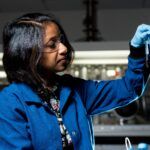Expected Outcome
Project results are expected to contribute to the following outcomes:
For supported doctoral candidates
- New research and transferable skills and competences, leading to improved employability and career prospects within and outside academia;
- New knowledge allowing the conversion of ideas into products and services, where relevant;
- Enhanced networking and communication capacities with scientific peers, as well as with the general public that will increase and broaden the research and innovation impact.
For participating organisations
- Improved quality, relevance and sustainability of doctoral training programmes and supervision arrangements;
- Enhanced cooperation and transfer of knowledge between sectors and disciplines;
- Increased integration of training and research activities between participating organisations;
- Boosted R&I capacity;
- Increased internationalisation and attractiveness;
- Regular feedback of research results into teaching and education at participating organisations.
Scope
MSCA Doctoral Networks will implement doctoral programmes, by partnerships of universities, research institutions and research infrastructures, businesses including SMEs, and other socio-economic actors from different countries across Europe and beyond. MSCA Doctoral Networks are indeed open to the participation of organisations from third countries, in view of fostering strategic international partnerships for the training and exchange of researchers.
These doctoral programmes will respond to well-identified needs in various R&I areas, expose the researchers to the academic and non-academic sectors, and offer training in research-related, as well as transferable skills and competences relevant for innovation and long-term employability (e.g. entrepreneurship, commercialisation of results, Intellectual Property Rights, communication). Proposals for doctoral networks can reflect existing or planned research partnerships among the participating organisations.
The selection procedure for doctoral candidates must be open, transparent and merit-based, in line with the Code of Conduct for the Recruitment of Researchers. The vacancy notice (to be widely advertised internationally, including on the EURAXESS website) must include the gross salary (not including employer’s social contributions) offered to the researcher.
MSCA Doctoral Networks are encouraged to lead to Industrial or Joint Doctorates.
Industrial Doctorates
Through Industrial Doctorates, doctoral candidates will step outside academia and develop skills in industry and business by being jointly supervised by academic and non-academic organisations, both of which can be established in the same EU Member State or Horizon Europe Associated Country.
Joint Doctorates
Joint Doctorates represent a highly integrated type of international, inter-sectoral and multi/interdisciplinary collaboration in doctoral training. They lead to the delivery of joint, double or multiple doctoral degrees recognised in at least two EU Member States or Horizon Europe Associated Countries.
Supervisory Board
Each MSCA Doctoral Network should have a clearly identified supervisory board co-ordinating network-wide training, research and in particular supervision activities in line with the MSCA Guidelines for supervision, while establishing continuous communication and exchange of best practice among the participating organisations to maximise the benefits of the partnership.
Training activities
MSCA Doctoral Networks should exploit complementarities between participating organisations and foster sharing of knowledge and networking activities for example through the organisation of workshops and conferences. Proposed training activities should respond to well identified needs in various R&I areas, with appropriate references to inter- and multidisciplinary fields and follow the EU Principles for Innovative Doctoral Training. They should be primarily focused on developing new scientific knowledge through original research on personalised projects.
Inter-sectoral secondments of researchers to other participating organisations, including in third countries, are encouraged when relevant, feasible and beneficial for the researchers and in line with the project objectives. This will increase the employability of the researchers outside academia.
Doctoral Networks should develop substantial training modules, including digital ones, addressing key transferable skills and competences common to all fields and fostering the culture of Open Science, innovation and entrepreneurship. In particular, Doctoral Networks should adequately prepare doctoral candidates for increased research collaboration and information-sharing made possible by new (digital) technologies (e.g. collaborative tools, opening access to publications and to research data, FAIR data management, public engagement and citizen science, etc.).
Supervision
Particular attention is paid to the quality of supervision and mentoring arrangements as well as career guidance. Joint supervision of the researchers is mandatory for Industrial and Joint Doctorates.
Career Development Plan
A Career Development Plan must be established jointly by the supervisor and each recruited doctoral candidate. In case of joint supervision, such a plan should be established involving all supervisors. In addition to research objectives, this plan comprises the researcher’s training and career needs, including training on transferable skills, teaching, planning for publications and participation in conferences and events aiming at opening science and research to citizens. The plan, established at the beginning of the recruitment, should be revised (and updated where needed) within 18 months.
Deadline
15 November 2022
For further information: Funding & tenders






Leave a Reply